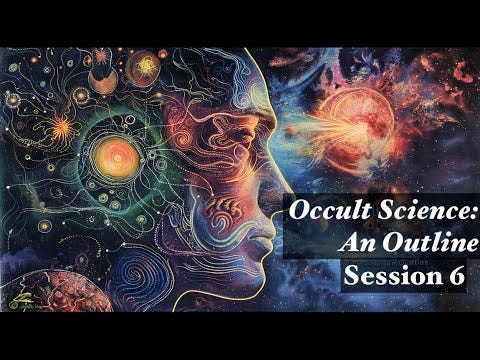This discussion covers pages 100 to 120 in the Adams translation of Occult Science, addressing the last segment of the "Sleep and Death" chapter and the beginning of Ch. 4: "Man and the Evolution of the World".
Steiner emphasizes the importance of specific, detailed explanations over vague generalities when discussing spirituality. He introduces the concept of developing spiritual organs of perception beyond the sense-bound intellect to understand spiritual causation. Steiner suggests we first consider reincarnation as a hypothesis. Even if not clairvoyant, adopting this hypothesis can transform one's perspective and behavior significantly. He illustrates this by highlighting how a deep acceptance of reincarnation allows one to understand life's challenges as self-inflicted, aiding in coping with life's vicissitudes.
Matt points out the ethical challenges associated with the concepts of karma and reincarnation, especially when misapplied to justify or rationalize trauma and suffering, such as rape or genocide. The speaker stresses the importance of personalizing these spiritual ideas without imposing them on others, recognizing the potential harm in such actions.
Steiner's teachings contrast with trauma-informed approaches prevalent in modern mental health paradigms, which sometimes focus excessively on trauma without fostering personal responsibility. This perspective invites discussion among professionals in psychology and therapy.
The conversation also touches on the idea that Steiner's view of spiritual causation requires individual realization, not proselytization, particularly in sensitive contexts of suffering. Steiner asserts that understanding karma and reincarnation is a personal journey, emphasizing the uniqueness of each human being (each individual human being is effectively its own species).
As the discussion transitions to Steiner's view on the evolution of man and the world, it explores how the human being is both a unity and a plurality, intricately connected to the universe. This connection is presented not just as interaction but as an evolving organism-environment matrix, suggesting a holistic view of evolution that transcends mere physical development and incorporates spiritual growth and development.
Steiner's philosophy suggests that spiritual evolution includes understanding the cycles of death and rebirth, not only at an individual level but across planetary phases, integrating past spiritual causes into present circumstances. This comprehensive view challenges participants to consider the broader implications of spiritual teachings on both personal growth and broader existential questions.
The session ends with an invitation to further dialogue and reflection, emphasizing the need for compassion and tact when discussing karma and reincarnation, especially given their potential for misinterpretation and the importance of communicating with sensitivity to contemporary ethical expectations and psychological sensitivities.




Thanks for your presence and participation today everyone! To help us better coordinate our reading for this cycle, below is a schedule for our remaining meetings with page numbers of the George and Mary Adams translation that Matt and I are using as well as paragraph numbers from the Creeger version.
Session 7: pages 121-141 or paragraphs (Chapter 4) 14-29.
Session 8: pgs 141-161 or para. (ch4) 30-46.
Session 9: pgs 161-181 or para (ch4) 47-60.
Session 10: pgs 181-201 or para (ch4) 61-73.
Session 11: pgs 201-221 or para (ch4) 74-93.
Session 12: pgs 221-240 or para (ch4) 94-105.
Session 13: pgs 240-261 or para (ch4) 106- (ch5) para 8.
Session 14: pgs 261-281 or para (ch5) 9-25.
Session 15: pgs 281-300 or para (ch5) 26-38.
Session 16: pgs 300-323 or para (ch5) 39-50.
Session 17: pgs 323-340 or para 51 and remainder of Chapter 5.
Session: all of Chapter 6.
Session 19: all of Chapter 7 + appendix/supplementary notes.
I mentioned a blog reply to me from William Irwin Thompson regarding evil. Here's the link to his comments: https://footnotes2plato.com/2023/10/25/william-irwin-thompsons-thoughts-on-evil/